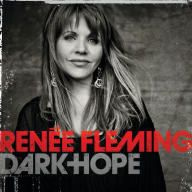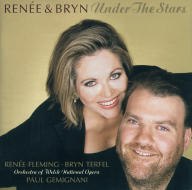Fleming was born February 14, 1959, in Indiana, Pennsylvania, but grew up mostly in Rochester, New York, where her parents were both high school singing teachers. She attended the State University of New York at Potsdam, majoring in music education, financing her schooling partly by singing in a jazz trio in a bar, and graduating in 1981. She turned down a chance to tour with jazz saxophonist Illinois Jacquet, instead enrolling in graduate voice studies at the Eastman School of Music in Rochester, where she studied with John Maloy. In the summers, she took lessons at the Aspen Music Festival and School in Colorado with Jan DeGaetani, among others. There, Fleming gave her first professional performances in Mozart's Le nozze di Figaro and in a contemporary work, Conrad Susa's Transformations. From 1983 to 1987, Fleming studied at the American Opera Center at the Juilliard School in New York; once again singing jazz to make money on the side, she studied there with Beverley Johnston, who remained her teacher for many years. A Fulbright Fellowship took Fleming to Europe in 1985 for studies with Arleen Augér and Elisabeth Schwarzkopf. A win at the Metropolitan Opera National Council Auditions in 1988, along with several other prizes, launched Fleming's career in earnest. She appeared as the Countess in Le nozze di Figaro at the Houston Grand Opera that year, made debuts in 1989 as Mimi in Puccini's La bohème at the New York City Opera and as Glauce in Cherubini's Medea, and made a major splash at the Metropolitan Opera in New York as the Countess in Le nozze di Figaro, substituting for an ailing Felicity Lott. The following year, Fleming made her recording debut on the Centaur label, appearing with the University of Connecticut Symphony Orchestra on an album of works by Sydney Hodkinson.
More debuts at the world's major houses followed, including those at the Vienna State Opera and La Scala in Milan (at the latter as Donna Elvira) in 1993, and as Eva in Wagner's Die Meistersinger at the Bayreuth Festival in 1996. Everywhere, her voice drew notice for its fullness, warmth, and creamy tone quality and for her ability to spin out long, velvety lines. Fleming has continued to appear at the world's top opera houses and concert halls in a large repertory stretching from Handel through the 19th century (in Italian, German, French, and English-language opera) to the contemporary era, including numerous Richard Strauss roles. She has created roles in several major contemporary operas, such as that of Rosina in John Corigliano's The Ghosts of Versailles.
In the middle and late 1990s, Fleming emerged as a major recording artist, often releasing as many as five albums in a single year. She has recorded mostly for the London and Decca labels. Her Handel album (2004) marked one of the first explorations by a world-class singer of Baroque repertory, and many other singers have followed in her footsteps. In the 2000s and 2010s, Fleming received a host of awards, including honorary membership in Britain's Royal Academy of Music (2003), designation as Chevalier of the Legion of Honor in France (2005), and the U.S. National Medal of the Arts (2012). She has been an advocate for the use of music in neuroscience research and health research generally.
In 2014, Fleming performed The Star-Spangled Banner at Super Bowl XLVIII. Fleming has avoided heavily marketed crossover releases but has increasingly often drawn on her background in jazz and pop on such releases as Broadway (2018). By that time, she had reached a level of popular stardom few opera singers have achieved, and she performed Danny Boy at the funeral of U.S. Senator John McCain that year. She has appeared on several film soundtracks, such as The Shape of Water (2018). In 2020, Fleming premiered And the People Stayed Home, a new pandemic-oriented work by Corigliano. She has kept up a steady schedule of new recordings and has made more than 60 albums in all, including Voice of Nature: The Anthropocene, in 2021. ~ James Manheim, Rovi


















